How Does It Feel?
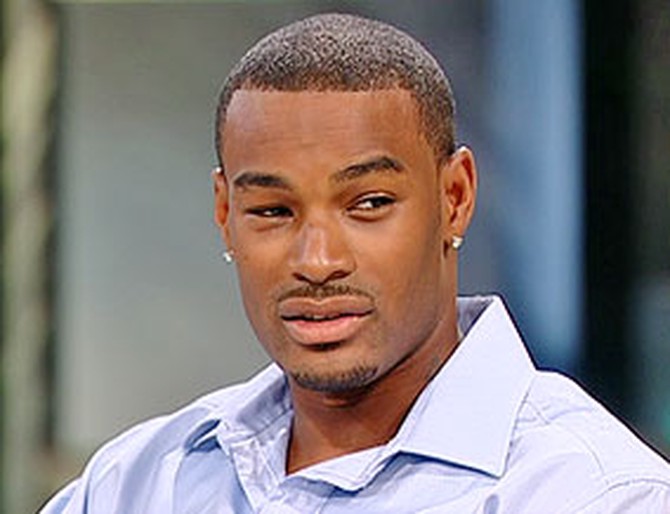
On the morning of June 6, 2005, Tyson Beckford—the face of Ralph Lauren and one of the most famous male models in the world—wanted to get an early start on his day. He had no idea what was to come.
Tyson says he was stopped at a stop sign on Route 3 in Secaucus, New Jersey, just outside of New York City, when he claims his truck was rear-ended by a tractor-trailor. Tyson says, "I…did a 180 spin and had my clutch foot in and my brake foot in. I was literally standing on top of it. I just hit the pole and wrapped the front end of my truck around it, and that was it."
Tyson says he was stopped at a stop sign on Route 3 in Secaucus, New Jersey, just outside of New York City, when he claims his truck was rear-ended by a tractor-trailor. Tyson says, "I…did a 180 spin and had my clutch foot in and my brake foot in. I was literally standing on top of it. I just hit the pole and wrapped the front end of my truck around it, and that was it."
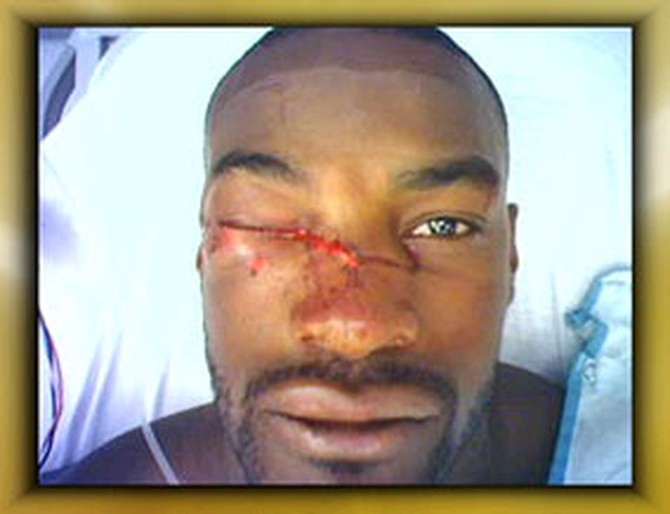
"I remember hitting the steering wheel," Tyson says. "It felt like someone had taken a baseball bat and hit me on [the right] side of my face. I fell back into my seat and it was such a shock. I didn't know what happened and I wasn't moving. Then I figured, 'Okay, I'm dead.'"
Tyson was indeed alive, but far from safety.
"I saw the flames coming out of the engine of my car," he says. "The engine was up to my leg, because it got pushed in about three feet and it cut my leg. I was saying to myself, 'The flames are getting bigger. Maybe you should get out.' But my body wasn't moving. I knew something was broken but didn't know what. My physical didn't want to move, but my spiritual just said, 'You know what? I'm going to have to do this for all of us.' And then I pushed the door open and fell out of the truck and looked back at the flaming truck and [it exploded]. And the further I got away from it, the taller the flames got. It was like it was waiting for me to get out and then it just went up."
Tyson says this near-death experience was almost unreal. "It was just like a movie," he says. "I felt like an action hero as I was running away. And I kept saying to myself, 'I can't believe this is happening to me.' Like, 'Am I on set?'"
Tyson was indeed alive, but far from safety.
"I saw the flames coming out of the engine of my car," he says. "The engine was up to my leg, because it got pushed in about three feet and it cut my leg. I was saying to myself, 'The flames are getting bigger. Maybe you should get out.' But my body wasn't moving. I knew something was broken but didn't know what. My physical didn't want to move, but my spiritual just said, 'You know what? I'm going to have to do this for all of us.' And then I pushed the door open and fell out of the truck and looked back at the flaming truck and [it exploded]. And the further I got away from it, the taller the flames got. It was like it was waiting for me to get out and then it just went up."
Tyson says this near-death experience was almost unreal. "It was just like a movie," he says. "I felt like an action hero as I was running away. And I kept saying to myself, 'I can't believe this is happening to me.' Like, 'Am I on set?'"
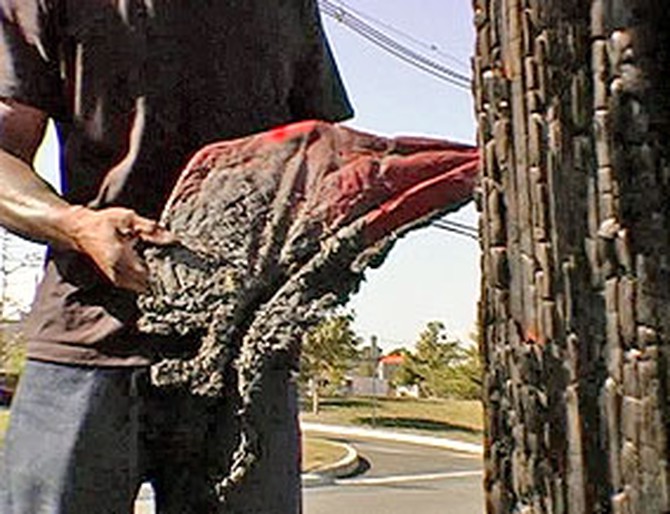
After four months, Tyson returned to the scene of his frightening accident and found disturbing evidence of his near-death experience. In the median, he found charred and semi-melted pieces of his red truck along with the bench he remembers staggering to while the flames from his truck reached higher than a light pole.
Tyson even located the oil filter he had once "put in with [his] own hands."
Tyson even located the oil filter he had once "put in with [his] own hands."
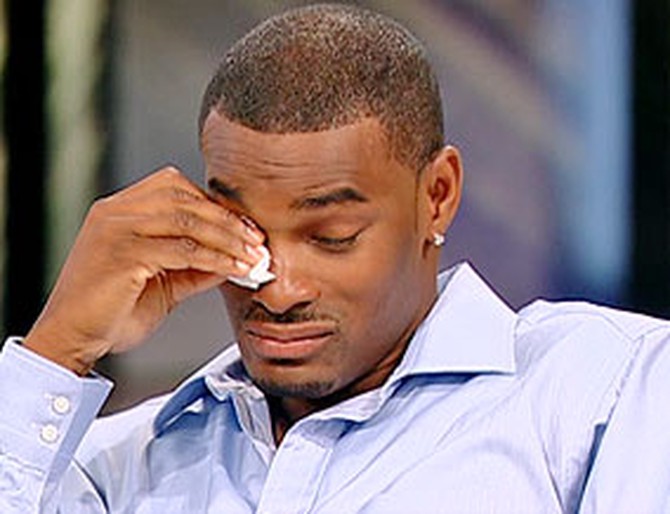
When he arrived at the hospital, Tyson remembers people asking him if he thought he'd be able to model again. "I was like, 'You don't understand. I'm alive. I don't care about that,'" Tyson says.
The day after the accident, Tyson's face swelled. He was worried when his son first visited him in the hospital because he didn't want him to be scared of the way he looked.
Knowing that if he'd been unable to move from his car a few seconds longer, he could have died, Tyson says his entire way of thinking has been altered. Now, he says, "I live every day like it's the last. I value life more now than I ever did before. My friends used to call me a daredevil, and I think that side of me is kind of gone now."
The day after the accident, Tyson's face swelled. He was worried when his son first visited him in the hospital because he didn't want him to be scared of the way he looked.
Knowing that if he'd been unable to move from his car a few seconds longer, he could have died, Tyson says his entire way of thinking has been altered. Now, he says, "I live every day like it's the last. I value life more now than I ever did before. My friends used to call me a daredevil, and I think that side of me is kind of gone now."
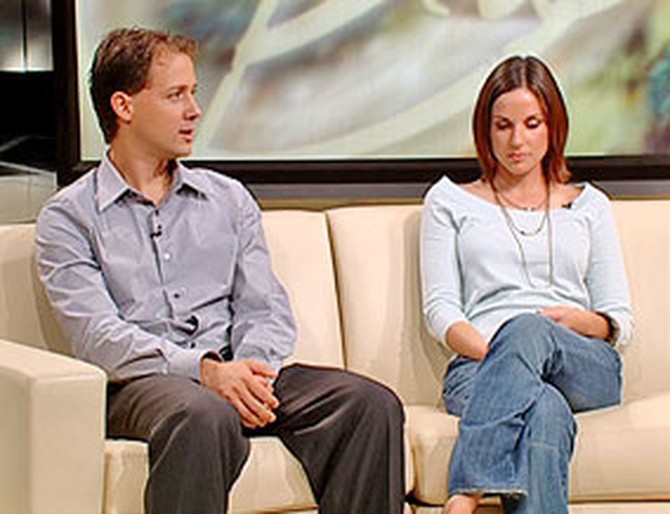
Sean and Amy met, fell in love, and had a beautiful wedding. But on the way to their honeymoon, the fairy tale was abruptly erased.
Sean and Amy parked at the airport and boarded a shuttle to their terminal. Sean says he realized he'd forgotten his wallet, and returned to their car to retrieve it. After more than an hour and 40 minutes, Sean still hadn't returned and Amy began to panic, frantically retracing his steps back to their car. She got all the way to the car, but couldn't find either the wallet or Sean. Amy then called the police, and even went on television with an appeal for information about her missing newlywed husband.
Despite the mysterious disappearance of her new husband, Amy says she never thought that Sean was a "runaway husband."
"He would never do that," she says. "I did go talk to some of the security guards at the airport. Some of them said that. They kind of joked, 'Oh, he probably ran away.' But that wasn't the case. I just knew something was wrong."
Three days later police found Sean disoriented and wandering outside an abandoned hotel. Amy rushed to be reunited with him, but her tears of joy were met with his blank stares. Sean did not recognize Amy, his own wife. "I was so happy that we found him. But at the same time, when he looked at me and I could tell he didn't know who I was, it was just a crushing feeling," Amy says. "It was the happiest and saddest moment at the same time."
Sean and Amy parked at the airport and boarded a shuttle to their terminal. Sean says he realized he'd forgotten his wallet, and returned to their car to retrieve it. After more than an hour and 40 minutes, Sean still hadn't returned and Amy began to panic, frantically retracing his steps back to their car. She got all the way to the car, but couldn't find either the wallet or Sean. Amy then called the police, and even went on television with an appeal for information about her missing newlywed husband.
Despite the mysterious disappearance of her new husband, Amy says she never thought that Sean was a "runaway husband."
"He would never do that," she says. "I did go talk to some of the security guards at the airport. Some of them said that. They kind of joked, 'Oh, he probably ran away.' But that wasn't the case. I just knew something was wrong."
Three days later police found Sean disoriented and wandering outside an abandoned hotel. Amy rushed to be reunited with him, but her tears of joy were met with his blank stares. Sean did not recognize Amy, his own wife. "I was so happy that we found him. But at the same time, when he looked at me and I could tell he didn't know who I was, it was just a crushing feeling," Amy says. "It was the happiest and saddest moment at the same time."
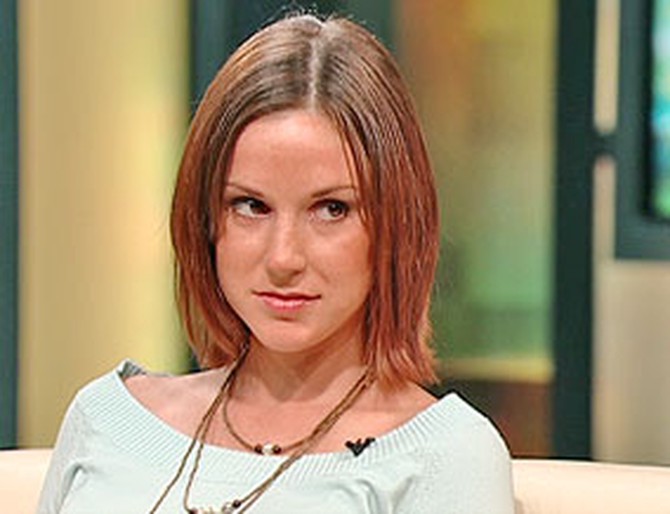
Doctors initially had trouble accurately diagnosing Sean's condition. Finally, Sean and Amy turned to one of the world's foremost experts on memory disorders. After extensive tests, the expert determined that Sean had a rare amnesia caused by the stress of the wedding combined with a terrible car accident one of his friends suffered on the night of the wedding.
All of Sean's memories were wiped from his brain. He was previously a disc jockey, but he found that he no longer liked the kind of music he played. "Everyone goes through their life with baggage they carry from when they're a kid to when they're an adult," Sean says. "You have your views of life and they're set. I didn't have any views of life…everything was gone for me."
"Even tasting an orange was new to him," Amy says. "Everything was new."
Sean's personality changed, too. "His mannerisms were different," Amy says. "He was almost childlike in a way because he didn't have the baggage or the cynicism and he likes to joke around and be sarcastic a lot and he wasn't like that at all."
All of Sean's memories were wiped from his brain. He was previously a disc jockey, but he found that he no longer liked the kind of music he played. "Everyone goes through their life with baggage they carry from when they're a kid to when they're an adult," Sean says. "You have your views of life and they're set. I didn't have any views of life…everything was gone for me."
"Even tasting an orange was new to him," Amy says. "Everything was new."
Sean's personality changed, too. "His mannerisms were different," Amy says. "He was almost childlike in a way because he didn't have the baggage or the cynicism and he likes to joke around and be sarcastic a lot and he wasn't like that at all."

About a year after he'd lost his memory in a flash, Sean regained it while he was getting out of the shower. "It was just like tunnel vision," he says. "I saw our engagement picture and … I just felt everything just hit me at once. I just sat down on the bed and started crying."
Sean says he was overcome not only in the realization of all that he'd forgotten—his memories, his tastes, his wife—but also because of the staggering difficulty of the previous year. He says he felt guilty about all that Amy and all of their friends and family had been through.
Sean says he was overcome not only in the realization of all that he'd forgotten—his memories, his tastes, his wife—but also because of the staggering difficulty of the previous year. He says he felt guilty about all that Amy and all of their friends and family had been through.
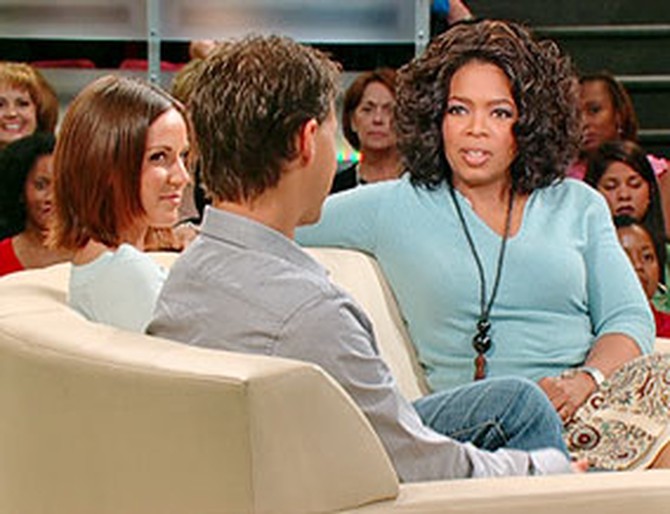
When Sean's memory returned in the shower, however, he says he wasn't exactly the same as he was before.
"I'm less judgmental now and I like to really try to enjoy the time I have now," Sean says. "Before [I was always] rushing to and from work and being with friends. We make time to do things together now and with our friends. Because you never know what's going to happen, we try to enjoy whatever we can with each other."
Amy says that she had no idea that her wedding vows would be tested so outrageously just hours after she'd made them. "They say, 'For better or for worse,'" she says, "but the worse came before the better."
"I'm less judgmental now and I like to really try to enjoy the time I have now," Sean says. "Before [I was always] rushing to and from work and being with friends. We make time to do things together now and with our friends. Because you never know what's going to happen, we try to enjoy whatever we can with each other."
Amy says that she had no idea that her wedding vows would be tested so outrageously just hours after she'd made them. "They say, 'For better or for worse,'" she says, "but the worse came before the better."
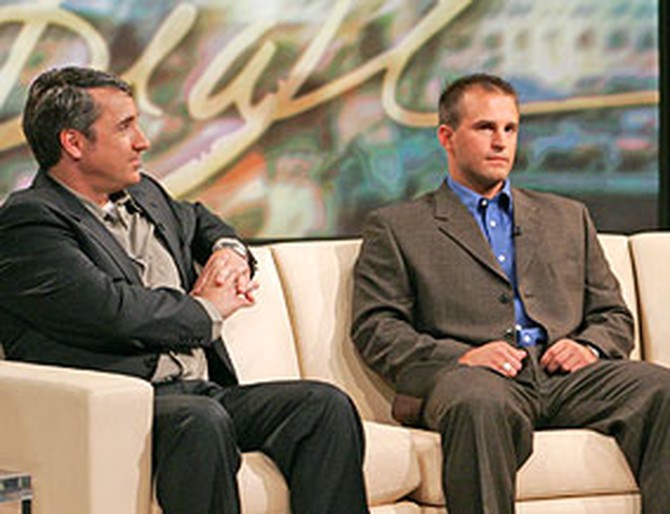
Ryan (on the right) says he's a religious conservative who believes that being gay is morally wrong. "I believe that homosexuality is a choice," he says. "It clearly says in the Bible that God made man and woman. It just doesn't make sense that he would have people born homosexuals."
Ed (left) is a gay man living in San Francisco. What happens when he and Ryan take part in a bold experiment and move in together for the FX show 30 Days?
Ed (left) is a gay man living in San Francisco. What happens when he and Ryan take part in a bold experiment and move in together for the FX show 30 Days?
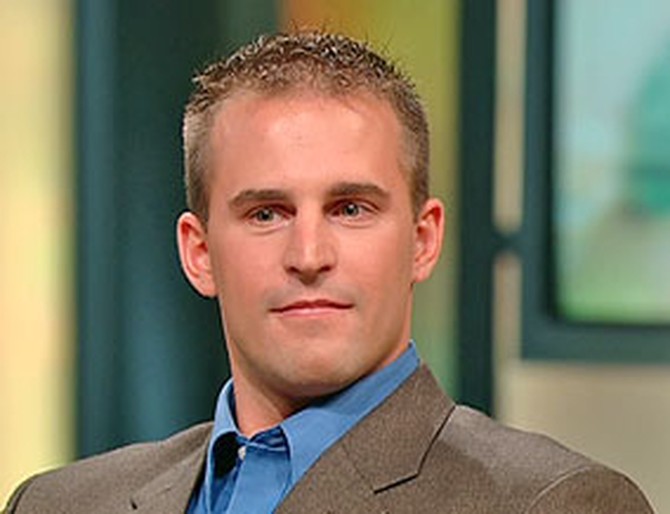
Ed throws Ryan a welcome dinner with a dozen of his closest friends. "I don't mean to be rude," Ryan says, "but it's, like, 12 gay guys?" Things only get more awkward at the restaurant. "No right or wrong answer," one of the men asks Ryan, "but Bush or Kerry?"
"I agree with Bush that marriage for homosexuals is wrong," Ryan answers. "… This is about the most uncomfortable conversation I've ever had."
Things don't get any easier for Ryan as the days progress. Strolling the streets of San Francisco, Ryan realizes that he is the minority. "So right now I'm standing in the gayest place on earth," Ryan says from his position in the city's famed Castro district. "I'm definitely the oddball here. I'm the outcast."
Ryan's rigid views gradually soften as he spends more time around gay people. At the beginning of the experiment, he felt that sexual orientation is a choice. "Throughout that experience and learning process," Ryan says, "there was so much stuff that I learned, and that's not something that I exactly have a firm belief on right now. I don't know if I would still take the stand that people [choose to be gay]."
"I agree with Bush that marriage for homosexuals is wrong," Ryan answers. "… This is about the most uncomfortable conversation I've ever had."
Things don't get any easier for Ryan as the days progress. Strolling the streets of San Francisco, Ryan realizes that he is the minority. "So right now I'm standing in the gayest place on earth," Ryan says from his position in the city's famed Castro district. "I'm definitely the oddball here. I'm the outcast."
Ryan's rigid views gradually soften as he spends more time around gay people. At the beginning of the experiment, he felt that sexual orientation is a choice. "Throughout that experience and learning process," Ryan says, "there was so much stuff that I learned, and that's not something that I exactly have a firm belief on right now. I don't know if I would still take the stand that people [choose to be gay]."
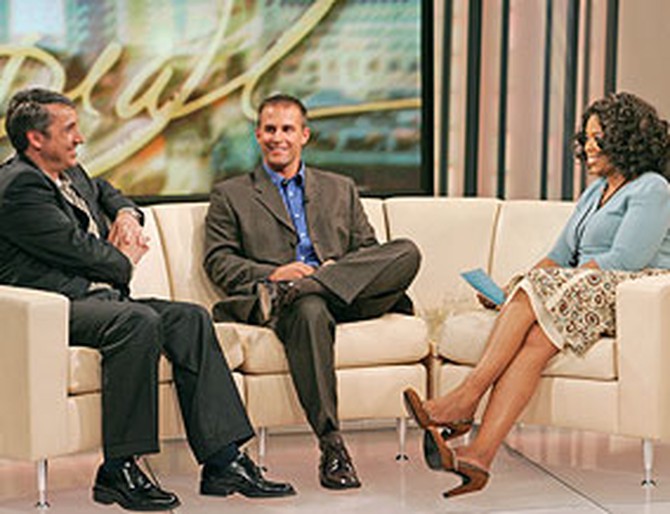
Once the initial shock of being immersed in gay culture begins to wear off, Ed takes Ryan to his first gay bar. Welcome to Daddy's!
"This is not my type of place," Ryan says. "I think this is the most uncomfortable place I've been in so far. This is disgusting in here. I don't mean to offend you guys. This is just some place that I would never want to be."
After his experience at Daddy's, Ryan swears off gay clubs—but a few weeks later, he gives it another chance. "That's the one place he's had a bad time," Ed explains, "and he wants to go back in."
What happens next surprises everyone—Ryan takes off his shirt and joins the guys on the dance floor. "I had gotten more comfortable being in that environment," Ryan explains. "You know, we had a couple drinks…."
Ryan is not the first straight guy to enjoy a gay bar. "Bars are bars and people can have fun there," Ed says. "There are a lot of gay people that go to straight bars and a lot of straight that go to gay. A lot of women like to go to gay bars because they can actually have a good time dancing, without having the problem of guys hitting on them. And straight guys … have realized that there's a lot of single straight girls at gay bars now, and so they're starting to come in."
"This is not my type of place," Ryan says. "I think this is the most uncomfortable place I've been in so far. This is disgusting in here. I don't mean to offend you guys. This is just some place that I would never want to be."
After his experience at Daddy's, Ryan swears off gay clubs—but a few weeks later, he gives it another chance. "That's the one place he's had a bad time," Ed explains, "and he wants to go back in."
What happens next surprises everyone—Ryan takes off his shirt and joins the guys on the dance floor. "I had gotten more comfortable being in that environment," Ryan explains. "You know, we had a couple drinks…."
Ryan is not the first straight guy to enjoy a gay bar. "Bars are bars and people can have fun there," Ed says. "There are a lot of gay people that go to straight bars and a lot of straight that go to gay. A lot of women like to go to gay bars because they can actually have a good time dancing, without having the problem of guys hitting on them. And straight guys … have realized that there's a lot of single straight girls at gay bars now, and so they're starting to come in."
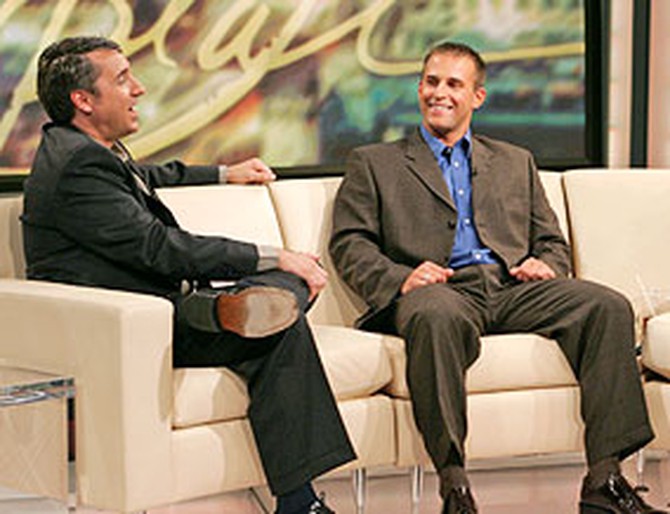
After being immersed in gay culture for two weeks, Ryan attends a support group for parents of gay children. One father tells Ryan about his daughter coming out. "I asked her how she knew," the father says, "and she looked me straight in the eye and she said, 'Dad, how do you know you're heterosexual?' I got it. My truth is that my daughter deserves to be treated with all the same respect and dignity and receive all the same privileges, rights and obligations as her two straight brothers."
"That was one of the more positive experiences I went through," Ryan says. "How he felt towards his [daughter] put me in a position to really think about it. What if my son or daughter was gay? Are you going to sit here and say you don't think they should be able to get married? They shouldn't have the same financial rights everybody else has, the same possibilities, chances or opportunities? To sit there and really think about that, you know, I don't care if my son or daughter is gay. I still want them to have all the same possibilities and opportunities that everybody else is going to have and that I have."
What did Ed learn from the experience? "After the last election," he says, "we were kind of fed this idea that there are blue states and there are red states. While that might be true on a few issues, I think that the real issue is simply people knowing that other people exist. It's a big country; there's lots of room for us. If you just take the time to get to know somebody, … the country looks a lot smaller. It to me is a collection of purple states. … It's not as divided as people think it is."
"That was one of the more positive experiences I went through," Ryan says. "How he felt towards his [daughter] put me in a position to really think about it. What if my son or daughter was gay? Are you going to sit here and say you don't think they should be able to get married? They shouldn't have the same financial rights everybody else has, the same possibilities, chances or opportunities? To sit there and really think about that, you know, I don't care if my son or daughter is gay. I still want them to have all the same possibilities and opportunities that everybody else is going to have and that I have."
What did Ed learn from the experience? "After the last election," he says, "we were kind of fed this idea that there are blue states and there are red states. While that might be true on a few issues, I think that the real issue is simply people knowing that other people exist. It's a big country; there's lots of room for us. If you just take the time to get to know somebody, … the country looks a lot smaller. It to me is a collection of purple states. … It's not as divided as people think it is."
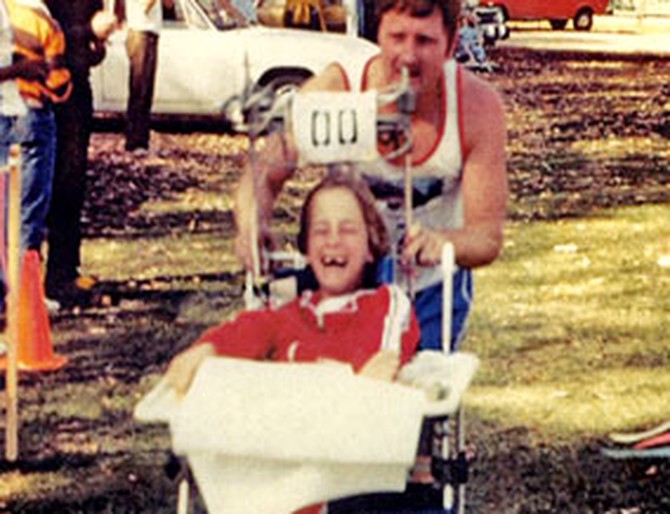
Forty-three years ago, Rick was born without the ability to talk, walk or barely move. "They said, 'Forget Rick,'" remembers his father, Dick. "'Put him in an institution. He's going to be nothing but a vegetable for the rest of his life.' My wife and I cried a little bit but we talked and we said, 'We're going to bring Rick home and bring him up like any other child."
Dick knew deep down that his son was thriving on the inside, and he insisted Rick go to school. He believed with every fiber of his being that his son had something to say—and he was right. At age 12, Dick had a special computer built so that Rick could communicate. What were his first words? Not "mom" or "dad" as his parents expected. "The Boston Bruins were going for the Stanley Cup," Dick remembers. "The very first words he ever said were 'Go, Bruins.'"
Rick, born with the heart of a true athlete, made a request that would change their lives forever—he asked his father to team up for a five-mile charity race. Dick had never run in his life. "We finished the whole five miles coming in next to last," Dick remembers, "but not last. When we came across the finish line, it was the biggest smile you ever saw in your life. Rick wrote on his computer, 'Dad, when I'm running, it feels like my disability disappears.'"
Dick knew deep down that his son was thriving on the inside, and he insisted Rick go to school. He believed with every fiber of his being that his son had something to say—and he was right. At age 12, Dick had a special computer built so that Rick could communicate. What were his first words? Not "mom" or "dad" as his parents expected. "The Boston Bruins were going for the Stanley Cup," Dick remembers. "The very first words he ever said were 'Go, Bruins.'"
Rick, born with the heart of a true athlete, made a request that would change their lives forever—he asked his father to team up for a five-mile charity race. Dick had never run in his life. "We finished the whole five miles coming in next to last," Dick remembers, "but not last. When we came across the finish line, it was the biggest smile you ever saw in your life. Rick wrote on his computer, 'Dad, when I'm running, it feels like my disability disappears.'"
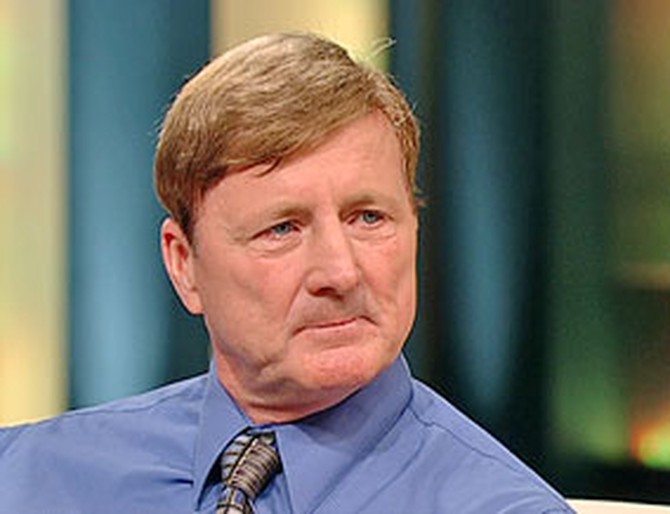
Even though Dick couldn't swim and hadn't been on a bike since he was 6 years old, the two used a running wheelchair and other special equipment and began training to compete in triathlons.
The pure joy Rick experiences during each race drives his father to the finish line again and again. "Rick can't make very many sounds," Dick says with tears in his eyes, "but he does [make a certain sound] a lot when we're out there competing. … You know he's happy and he enjoys himself."
So far Rick and Dick have competed in over 206 triathlons and 64 marathons!
The pure joy Rick experiences during each race drives his father to the finish line again and again. "Rick can't make very many sounds," Dick says with tears in his eyes, "but he does [make a certain sound] a lot when we're out there competing. … You know he's happy and he enjoys himself."
So far Rick and Dick have competed in over 206 triathlons and 64 marathons!
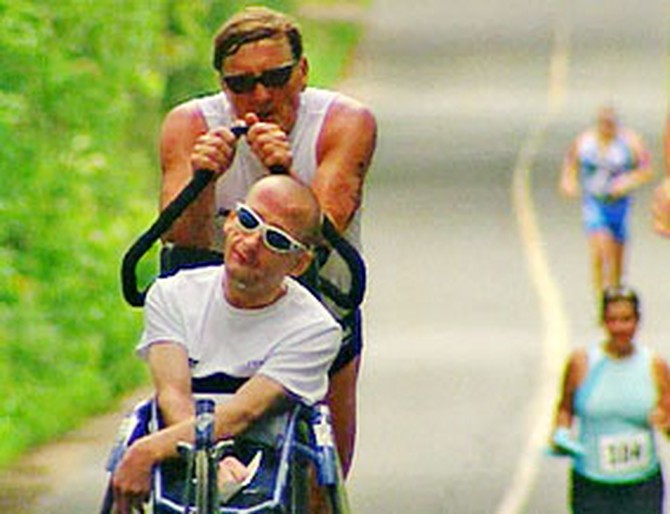
Preparing to run their 23rd Boston marathon, Dick went to see a doctor about a tickle in his throat. An EKG revealed that Dick had suffered a silent heart attack. She informed Dick that he had a severe cholesterol problem and told him that if he weren't in such great athletic condition, he would have died 15 years ago!
"When [Rick] asked me to start pushing him that first race," Dick says, "I was not a runner and I was kind of overweight—maybe becoming a couch potato. He's got me in the best shape of my life and I just love to be out there competing with Rick. … Rick is a fighter and he never gives up. To me, he's the athlete and I'm just out there loaning him my arms and legs so that he can compete."
"When [Rick] asked me to start pushing him that first race," Dick says, "I was not a runner and I was kind of overweight—maybe becoming a couch potato. He's got me in the best shape of my life and I just love to be out there competing with Rick. … Rick is a fighter and he never gives up. To me, he's the athlete and I'm just out there loaning him my arms and legs so that he can compete."
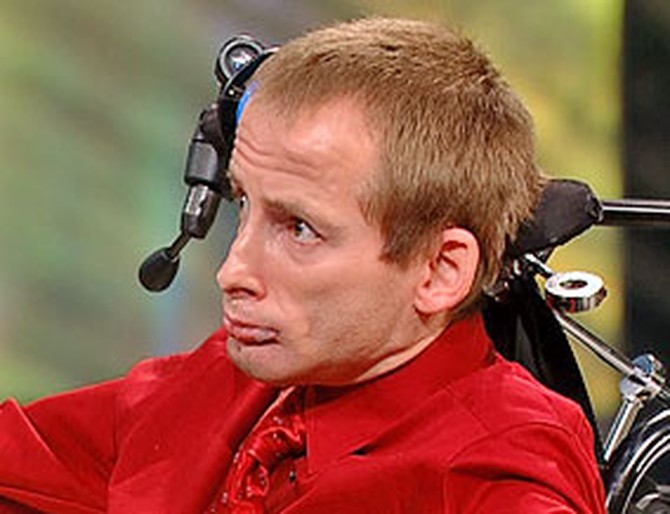
Rick is a graduate from Boston University with a degree in special education, and he even lives on his own. Through a special computer he is able to communicate his thoughts.
"Until my dad agreed to run that first race, I had no chance," Rick says through his computer. "My dad is my everything. He has made my dreams come true. To steal a line from a song, my dad is the 'wind beneath my wings.'"
"Until my dad agreed to run that first race, I had no chance," Rick says through his computer. "My dad is my everything. He has made my dreams come true. To steal a line from a song, my dad is the 'wind beneath my wings.'"
Published 10/20/2005

